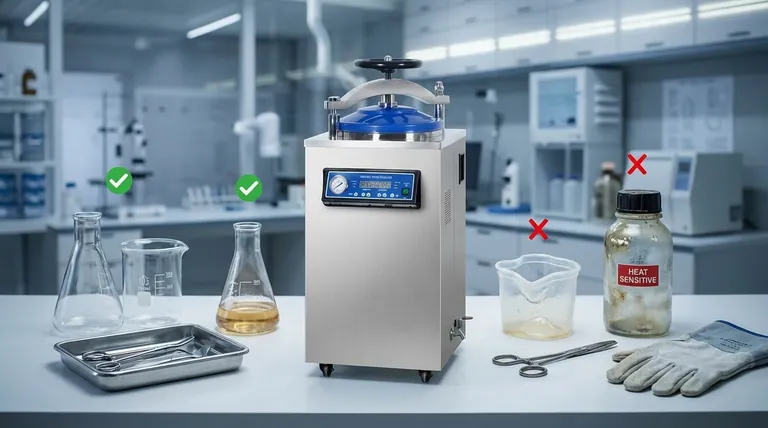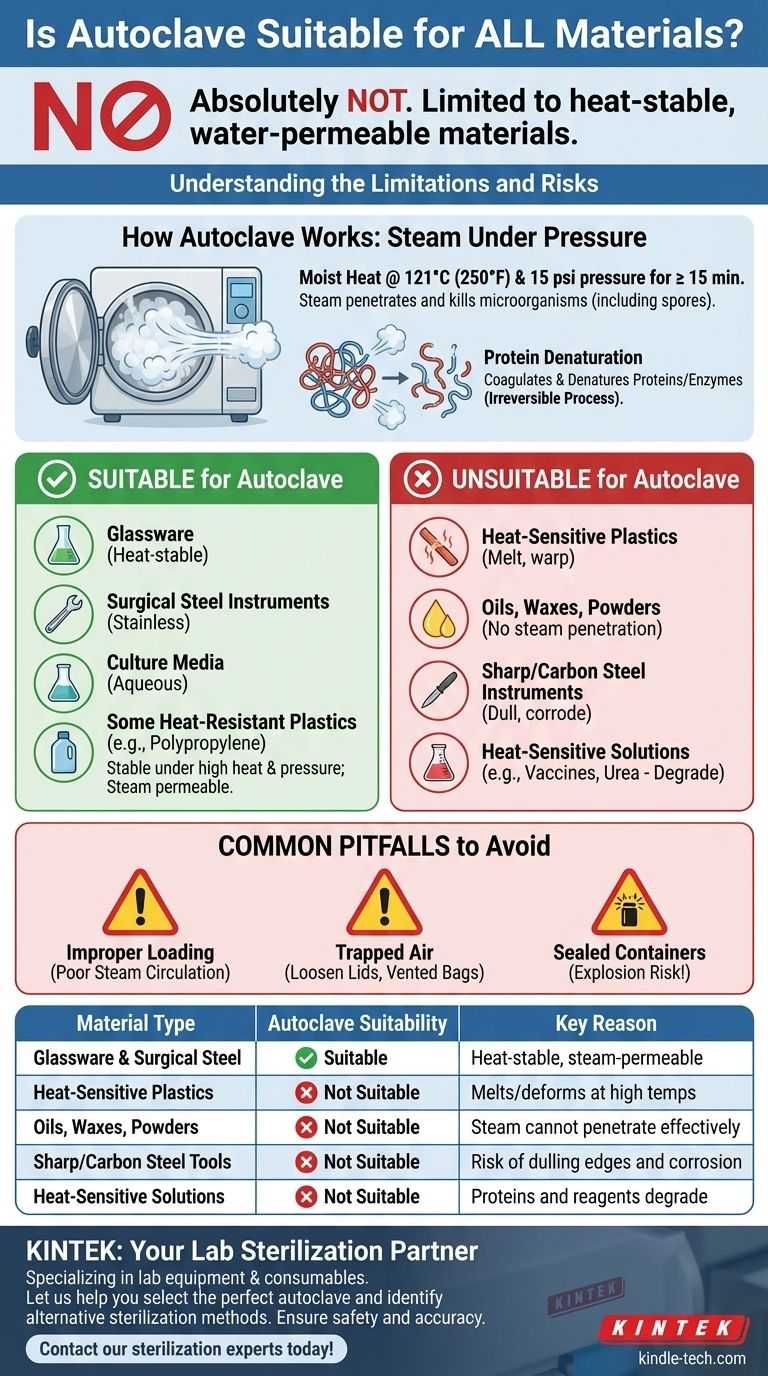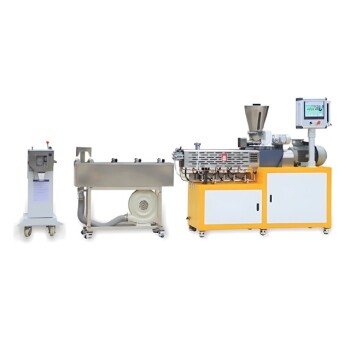Absolutely not. An autoclave is a powerful sterilization tool, but its effectiveness is strictly limited to materials that can withstand high temperatures and pressurized steam. Attempting to autoclave unsuitable items can result in melted plastic, dulled instruments, degraded solutions, or incomplete sterilization, posing significant risks to both your materials and your work.
The core principle of autoclaving is sterilization through high-temperature, high-pressure steam. This makes it ideal for heat-stable, water-permeable items but fundamentally incompatible with materials that are heat-sensitive, water-repellent, or prone to corrosion from moisture.

How an Autoclave Achieves Sterilization
The Power of Steam Under Pressure
An autoclave does not simply use heat; it uses moist heat under pressure. This combination is key to its effectiveness.
Typically, an autoclave operates at 121°C (250°F) and 15 lbs of pressure for at least 15 minutes. This environment forces steam to penetrate materials and kill microorganisms, including highly resistant bacterial spores.
The Mechanism of Destruction
The moist heat works by coagulating and denaturing the essential proteins and enzymes within microorganisms. This process is irreversible and far more efficient than dry heat, ensuring a complete kill.
Materials Unsuitable for Autoclaving
Understanding what not to put in an autoclave is just as important as knowing what you can. The limitations are based directly on the sterilization mechanism of heat and steam.
Heat-Sensitive Plastics and Polymers
Many common plastics have a melting point below the autoclave's operating temperature. Placing them inside will lead to melting, warping, and deformation, potentially damaging the equipment and rendering the item useless.
Oily, Waxy, or Anhydrous Substances
Steam is water-based and cannot effectively penetrate oils, waxes, or powders. Because the moist heat cannot make direct contact with potential contaminants within these substances, sterilization will be incomplete.
Sharp-Edged or High-Carbon Steel Instruments
The combination of high heat and moisture can dull the fine edges of instruments like high-grade scalpels or scissors. Furthermore, it can promote rust and corrosion on metals like carbon steel.
Certain Biological and Chemical Solutions
High-protein solutions, including some vaccines, serums, and reagents like urea, can be degraded or destroyed by excessive heat. The denaturing process that kills microbes will also denature these sensitive compounds.
Common Pitfalls to Avoid
Even with suitable materials, improper technique can lead to failed sterilization or safety hazards.
The Risk of Improper Loading
Overloading the chamber or allowing items to touch the walls prevents proper steam circulation. Every item must have adequate space around it for steam to penetrate from all sides. Use an autoclave basket to keep items organized and separated.
The Danger of Trapped Air
Air pockets are cold spots that steam cannot reach, creating a point of sterilization failure. To prevent this, always loosen the lids on bottles and jars, ensure sterilization bags are not completely sealed, and place empty glassware on its side or upside-down.
The Hazard of Sealed Containers
Never place a tightly sealed container in an autoclave. As the temperature rises, the pressure inside the container will build dramatically, creating a serious explosion risk.
Making the Right Choice for Your Sterilization Needs
Selecting the correct sterilization method is critical for ensuring safety, preserving material integrity, and achieving valid results.
- If your primary focus is glassware, surgical steel, or culture media: Autoclaving is the gold standard for its reliability and effectiveness, provided you follow proper loading procedures.
- If your primary focus is heat-sensitive plastics or delicate instruments: You must use an alternative, such as chemical sterilization or other low-temperature methods.
- If your primary focus is oils, powders, or other non-aqueous substances: Dry heat sterilization is the appropriate method, as steam-based autoclaving will be entirely ineffective.
Understanding these fundamental principles empowers you to use sterilization equipment safely and effectively.
Summary Table:
| Material Type | Autoclave Suitability | Key Reason |
|---|---|---|
| Glassware & Surgical Steel | ✅ Suitable | Heat-stable, steam-permeable |
| Heat-Sensitive Plastics | ❌ Not Suitable | Melts/deforms at high temperatures |
| Oils, Waxes, Powders | ❌ Not Suitable | Steam cannot penetrate effectively |
| Sharp/Carbon Steel Tools | ❌ Not Suitable | Risk of dulling edges and corrosion |
| Heat-Sensitive Solutions | ❌ Not Suitable | Proteins and reagents degrade |
Ensure Safe and Effective Sterilization for Your Lab
Choosing the right sterilization method is crucial for protecting your valuable equipment and ensuring accurate results. KINTEK specializes in lab equipment and consumables, providing expert solutions for all your sterilization needs.
Let us help you:
- Select the perfect autoclave for your specific materials
- Identify the best sterilization methods for heat-sensitive items
- Maintain your equipment for optimal performance and longevity
Don't risk damaging your materials or compromising your work. Contact our sterilization experts today for personalized guidance and reliable lab solutions!
Visual Guide

Related Products
- Laboratory High Pressure Steam Sterilizer Vertical Autoclave for Lab Department
- Laboratory Sterilizer Lab Autoclave Herbal Powder Sterilization Machine for Plant
- Desktop Fast Laboratory Autoclave Sterilizer 35L 50L 90L for Lab Use
- Desktop Fast Laboratory Autoclave Sterilizer 20L 24L for Lab Use
- Portable Digital Display Automatic Laboratory Sterilizer Lab Autoclave for Sterilization Pressure
People Also Ask
- Why is it important to autoclave the prepared reagents before using? Ensure Sterility and Reliable Results
- How long does it take to autoclave instruments? Get the Full Breakdown for Effective Sterilization
- Why must Ni-Cr alloy and carbon-coated samples be treated in a pressure steam autoclave? Ensure Data Integrity
- What physical conditions does an autoclave provide during hydrothermal liquefaction? Unlock Superior Bio-Polyol Yields
- What conditions do stainless steel autoclaves provide for reactor simulation? Expert Material Testing Solutions
- What is the recommended inspection frequency for laboratory autoclaves? Expert Maintenance Protocols for Safe Operation
- What lab supplies should be autoclaved? A Guide to Safe Sterilization and Decontamination
- What are the settings for autoclaving glassware? A Guide to Effective Sterilization



















